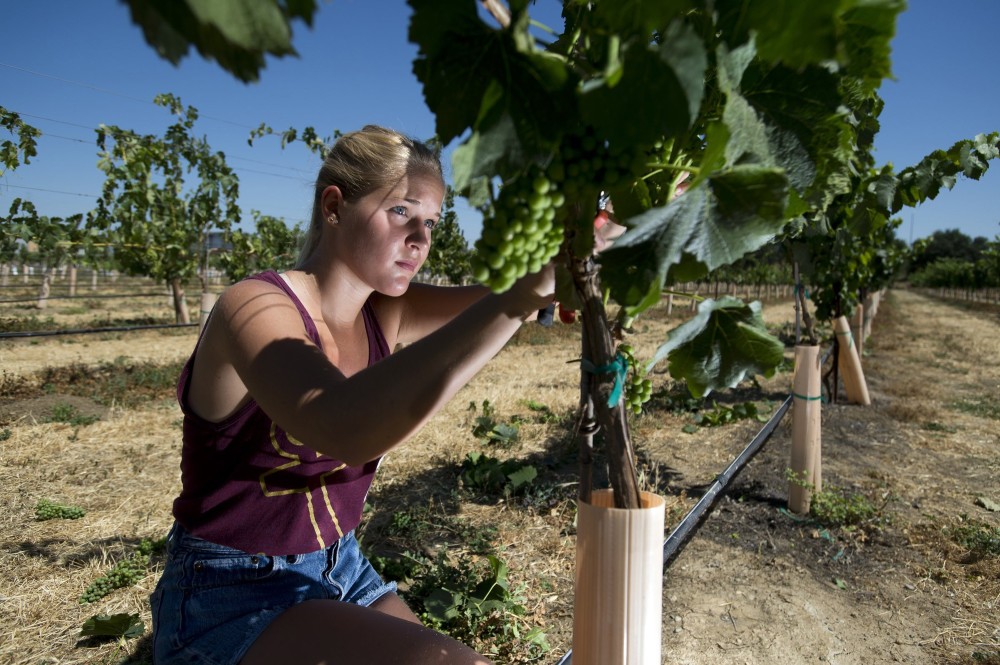By Alexei Koseff
The Sacramento Bee.
SACRAMENTO, Calif.
The family business brought Holly Reynolds from a grape farm in Kansas to the renowned viticulture and enology department at the University of California, Davis.
Since she decided in high school to follow her parents into winemaking, Reynolds knew she wanted to attend a program many consider “the best in the country, the best in the world.”
Paying high out-of-state fees, however, she’s planning to minimize her costs by finishing in three years, and that’s put her in a predicament.
Reynolds won’t turn 21 until April, just two months before she’s to graduate. As a result, she’s unable to partake in an essential part of her educational experience: wine tasting.
It’s a fundamental problem for students in California’s winemaking and beer-brewing programs, which also include California State University, Fresno, Cal Poly San Luis Obispo and several community colleges.
As undergraduates, many are under the legal drinking age for most of their time in school and cannot participate in classroom or extracurricular tastings that would allow them to get a firsthand understanding of theory, develop their palates and network with industry representatives who visit campus.
“You have to be a bystander and listen to what other people have to say about” the wines, Reynolds said during a recent vineyard-management class. Under the beating June sun, she and fellow students pruned leaves from grapevines in a field outside UC Davis’ Mondavi Institute for Wine and Food Sciences.
Reynolds worries that “it’s really going to hold me back” looking for a job at a winery after graduation. “They’re going to expect you to have substantial knowledge on not only their grapes and styles of winemaking,” she said, but also grapes and styles from across the world.
Though it’s an issue that affects only a narrow slice of students, about 100 at UC Davis, the Legislature is working on a solution. Assembly Bill 1989, sponsored by Assemblyman Wesley Chesbro, D-Arcata, would craft an exemption to California’s prohibition on “furnishing alcohol to a minor,” allowing 18-, 19- and 20-year-old students in enology and brewing science to taste alcohol as part of their classes.
“AB 1989 will ensure that students will have the same educational opportunities and they won’t be delayed” in graduating, Chesbro said May 15 on the Assembly floor. “It will guarantee that our graduates will remain competitive in our thriving wine and beer industries.”
Twelve other states, including Oregon, Washington and New York, already have similar laws on the books. Chesbro has declined to speak further with the press about the legislation.
The idea for the California bill originated with Andrew Waterhouse, a professor of wine chemistry at UC Davis who has been concerned for many years that age restrictions on tastings detracted from students’ education.
The Davis program begins primarily with general science requirements. Then students specialize in their last two years, learning sensory analysis and getting hands-on training in growing grapes and running equipment.
Tasting is important to all of it, said Waterhouse, who added that students would benefit from having more time in school to develop their palates.
“Learning what the wine generally tastes like at different stages, and then how to detect different problems and whether things are going well or not, takes some practice,” he said.
UC Davis has adjusted its curriculum to push more of those courses toward the end of the program, when most students are of legal drinking age, but the restriction still has an impact on their ability to learn.
The wine-production class is offered to upper-division students in the fall, when grapes are available after harvest. Since not all students have turned 21 by that point, however, the professor has removed tastings from the course so as not to leave anyone out.
Students can still get some sensory understanding through smell, Waterhouse said, but “a lot of the experience you can only get by tasting.”
He said one can only taste sweetness or sourness, for example, which are “very important in fermentation.”
Jaclyn Cubillas, a 20-year-old in her first year at UC Davis, said the age restriction can also be isolating for underage students, who aren’t able to fully integrate into the department until they turn 21.
“I can’t actually make wine. I can’t go to any tastings or department parties,” she said. “I can’t physically do anything.”
Cubillas transferred to Davis from the University of Arizona this year after reading a book about viticulture by Davis professor Douglas Adams that captured her imagination. But she’s taken up a minor in animal care while she waits to begin her winemaking courses.
“What would really affect a lot of students is being able to be in the winery,” Cubillas said.
Adrian Lopez, director of state government relations at UC Davis, brought the bill to Chesbro. He said there has been no formal opposition, but it has had to overcome some misconceptions.
“Sometimes I get the chuckle,” he said. “With this bill, there will be a perception that it’s allowing for underage drinking.”
Lopez said UC Davis was “very careful in the way we scripted the language,” permitting an exemption only for instructional purposes in required classes at accredited universities. Students must be at least 18 and may “taste, but not imbibe.”
Supporters have even given AB 1989 a crafty nickname: the “sip and spit” bill.
Lopez said it’s “a catchy phrase for people to understand” the limits of the proposed change, but Waterhouse said it’s also a fairly accurate reflection of what goes on in the industry. After all, no one wants to be drunk on the job.
“People have this romantic notion that winemakers are sitting around drinking wine and talking about it,” Waterhouse said.
“Winemakers spend their days running around, and if they’re drinking, they’re spitting.”














































































































































































































































































































































































